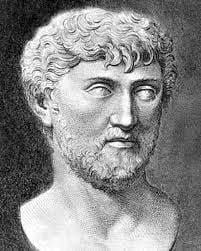Lucretius, also known as ‘Titus Lucretius Carus’, was a Roman poet and philosopher best known for his epic poem ‘De Rerum Natura’ (‘On the Nature of Things’). His work explores ‘Epicurean’ philosophy, discussing the nature of the universe, human life, and the pursuit of happiness through reason.
Lucretius | Brief Biography
Lucretius Carus was a Roman poet and philosopher of the 1st century BCE. He was born into a prominent and wealthy family in the early part of the century, and lived a relatively short life, likely dying in his mid-40s. Despite his brief time on earth, he made a lasting impact through his writing, especially through his epic poem “De Rerum Natura” (On the Nature of Things).
Lucretius was a follower of the philosophy of Epicureanism, which was founded by the Greek philosopher Epicurus. This philosophy taught that the ultimate goal of human life was to achieve ataraxia or peace of mind and that this could be achieved by seeking pleasure and avoiding pain. It also emphasized the importance of understanding the natural world and rejecting superstitions and religious beliefs.
Lucretius’ poem, “De Rerum Natura“, was a philosophical and didactic work that aimed to convey Epicurean philosophy to a Roman audience. The poem is a blend of science, ethics, and theology, and covers a wide range of topics, from the nature of the universe and the atomic theory of matter to the fear of death and the idea of the soul. In the poem, Lucretius presents a materialist explanation for the world and all its phenomena, and he argues against the existence of the gods and an afterlife.
Lucretius’ writing style was innovative for his time, blending philosophical argument with lyrical poetry. The poem was written in hexameters, a metrical form that was typically used for epic poetry, and Lucretius used this form to great effect, creating a work that was both intellectually engaging and emotionally powerful.
Despite its innovative and thought-provoking content, Lucretius’ poem was largely unknown and overlooked for centuries after his death. It was rediscovered in the 14th century and became widely read during the Renaissance when interest in Epicureanism and materialism was rekindled. The poem had a profound influence on European thought and culture, and was widely read and discussed by philosophers, scientists, and poets alike.
In conclusion, Lucretius was a pioneering writer and philosopher who left a lasting legacy through his epic poem “De Rerum Natura”. His writing blended philosophy and poetry in a way that was innovative for his time, and his ideas on the nature of the universe and the importance of seeking pleasure and avoiding pain continue to be relevant and thought-provoking to this day. 0 0 0.
.
Lucretius: Comprehensive Biography
Lucretius, full name ‘Titus Lucretius Carus’, was a Roman poet and philosopher who lived during the 1st century BCE. He is best known for his epic philosophical poem ‘De Rerum Natura’ (‘On the Nature of Things’). This work is considered one of the most important texts in Roman literature and presents the ideas of ‘Epicurean’ philosophy in poetic form. Lucretius aimed to explain the nature of the universe, the role of humans within it, and the path to achieving a peaceful, fulfilled life.
Early Life
Little is known about the early life of Lucretius. Historical sources provide very few details about his background, upbringing, or personal life. He was likely born in the early part of the 1st century BCE, possibly around 99 BCE, but the exact date and place of his birth remain uncertain. Some accounts suggest that he was born into a noble Roman family, but this is speculative.
What is clear is that Lucretius lived during a time of great political and social upheaval in Rome, as the Roman Republic was transitioning toward becoming an empire. This tumultuous period may have influenced his philosophical outlook and his desire to seek solace in the rational and peaceful teachings of ‘Epicureanism’.
Epicurean Philosophy
Lucretius was a follower of the Greek philosopher ‘Epicurus’, whose teachings form the foundation of ‘Epicurean’ philosophy. ‘Epicureanism’ seeks to understand the nature of the world through observation and reason, rejecting superstition and the fear of divine punishment. ‘Epicurus’ taught that the universe was composed of atoms and void, and that everything, including the human soul, was made of these small particles.
A key tenet of ‘Epicureanism’ is the belief that the gods exist but are indifferent to human affairs. According to this philosophy, the goal of life is to achieve ‘ataraxia’—a state of peace and tranquility—by eliminating unnecessary desires and fears, especially the fear of death. The ‘Epicureans’ also emphasized the pursuit of simple pleasures and the cultivation of friendships as important paths to happiness.
Lucretius sought to make these ideas accessible to Roman readers through his epic poem, ‘De Rerum Natura’. In doing so, he hoped to free people from the anxieties of superstition, fear of death, and the unknown.
‘De Rerum Natura’ (‘On the Nature of Things’)
‘De Rerum Natura’ is Lucretius’ greatest and only surviving work. Written in six books, the poem explores a wide range of subjects, including the nature of the universe, the development of life, the soul, human emotions, and the principles of ethics. The poem is written in dactylic hexameter, the traditional meter for epic poetry, which helped make complex philosophical ideas more accessible and memorable.
Book 1: The Nature of the Universe
In the first book, Lucretius outlines the basic principles of ‘Epicurean’ physics. He explains that the universe is made of atoms and void, and that everything that exists is composed of these fundamental building blocks. He rejects the notion of divine intervention in the natural world, arguing that natural phenomena can be explained by physical laws.
Book 2: Atomic Motion
The second book focuses on the movement of atoms and how they combine to form various substances. Lucretius explains that atoms are in constant motion and that their random collisions and combinations give rise to the world we experience. He also emphasizes that nothing comes into existence from nothing, nor can anything be completely destroyed, as everything is made of atoms that persist through change.
Book 3: The Soul and Mortality
In the third book, Lucretius explores the nature of the human soul and the inevitability of death. He argues that the soul, like the body, is made of atoms and is therefore mortal. When the body dies, the soul disperses and ceases to exist. This, according to Lucretius, means that there is no afterlife and no reason to fear death. By accepting the naturalness of death, people can live without the crippling fear of what comes after life.
Book 4: Sensation and Thought
The fourth book deals with the senses and how humans perceive the world. Lucretius describes how sensory perception works through the interaction of atoms with the senses, and he delves into the nature of thought, dreams, and emotions. He also addresses the dangers of irrational desires, particularly the intense passions associated with love, which he believes can disrupt the calm state of mind necessary for happiness.
Book 5: The Creation of the World
In the fifth book, Lucretius discusses the creation of the world and the development of human civilization. He explains how the earth, the heavens, and living creatures came into existence through natural processes, without the intervention of gods. He also traces the evolution of human society, from primitive times to the establishment of agriculture, cities, and laws.
Book 6: Natural Phenomena and Disease
The final book focuses on explaining natural phenomena, such as thunder, lightning, earthquakes, and volcanic eruptions. Lucretius seeks to show that these events are not caused by the anger of the gods but can be understood through natural laws. The book concludes with a vivid description of the plague of ‘Athens’, which serves as a reminder of the fragility of human life and the importance of rational understanding.
Influence and Legacy
Although ‘De Rerum Natura’ did not achieve widespread fame during Lucretius’ lifetime, it had a profound impact on later thinkers, particularly during the ‘Renaissance’. The rediscovery of Lucretius’ work in the 15th century helped to fuel the development of scientific thought and the rejection of superstition. His ideas about the nature of the universe, the importance of reason, and the pursuit of peace and tranquility resonated with scholars, scientists, and philosophers.
Lucretius’ poem has influenced figures such as ‘Galileo’, ‘Isaac Newton’, and ‘Thomas Jefferson’. The materialist and atomistic philosophy that he presented laid the groundwork for modern science, and his emphasis on the pursuit of happiness through rational understanding continues to inspire those who seek to live a life free from fear and superstition.
Death and Mystery
The circumstances surrounding Lucretius’ death are as mysterious as his life. One account, given by the Roman historian ‘Jerome’, suggests that Lucretius went mad after taking a love potion and later committed suicide. However, this account is widely disputed, and many scholars believe it was an attempt to discredit his philosophical ideas, which were seen as controversial in a society that held strong religious beliefs.
Lucretius likely died around 55 BCE, but the exact cause of his death remains unknown. Despite the uncertainty surrounding his personal life, his work endures as one of the most significant contributions to Roman literature and philosophy.
Conclusion
Lucretius was a profound thinker whose philosophical ideas and poetic skill made him one of the most important figures in Roman intellectual history. His epic poem, ‘De Rerum Natura’, not only presented ‘Epicurean’ philosophy to a Roman audience but also laid the foundation for many scientific and philosophical developments that would follow in the centuries to come. By challenging superstitions and promoting the use of reason, Lucretius’ work continues to inspire those seeking a deeper understanding of the natural world and the human condition. His legacy lives on as a testament to the power of reason and the pursuit of knowledge in the face of uncertainty. 0 0 0.
.
Lucretius: Data in Brief
- Full Name: Titus Lucretius Carus
- Birth: Circa 99 BCE, Roman Republic (exact location unknown)
- Famous Work: ‘De Rerum Natura’ (‘On the Nature of Things’)
- Philosophy: ‘Epicureanism’ (focuses on atomism, rational thought, and the rejection of fear, especially fear of death)
- Main Themes: Nature of the universe, the soul, mortality, the role of reason, the pursuit of peace (‘ataraxia’)
- Died: Circa 55 BCE (cause of death uncertain)
- Legacy: Influential in Renaissance thought, scientific developments, and materialist philosophy
Lucretius: FAQs
1. Who was Lucretius?
Lucretius was a Roman poet and philosopher known for his epic poem ‘De Rerum Natura’, which explains ‘Epicurean’ philosophy and explores the nature of the universe, the soul, and human existence.
2. What is ‘De Rerum Natura’ about?
‘De Rerum Natura’ (‘On the Nature of Things’) is a six-book poem that explains ‘Epicurean’ philosophy, discussing topics such as atomic theory, the nature of the soul, the fear of death, and the development of civilization.
3. What are the key themes in Lucretius’ work?
Lucretius’ work covers themes like atomic theory, the nature of the soul, human mortality, the rejection of superstition, and the pursuit of peace and happiness through rational understanding.
4. What is ‘Epicureanism’?
‘Epicureanism’ is a philosophy founded by the Greek philosopher ‘Epicurus’, which emphasizes the pursuit of happiness and tranquility through knowledge, self-control, and the rejection of unnecessary desires and fears, particularly the fear of death.
5. Why is Lucretius important in history?
Lucretius is important for his role in preserving and presenting ‘Epicurean’ philosophy to a Roman audience. His work significantly influenced later thinkers, particularly during the ‘Renaissance’, and contributed to the development of scientific and materialist thought.
6. How did Lucretius influence later thinkers?
Lucretius’ ideas on atomism and the natural world influenced figures like ‘Galileo’, ‘Isaac Newton’, and ‘Thomas Jefferson’. His rejection of superstition and his focus on reason helped shape early scientific thought.
7. What do we know about Lucretius’ personal life?
Very little is known about Lucretius’ personal life. There are no surviving detailed accounts, and much of what has been said about his life is speculative or based on later, unreliable sources.
8. What is the significance of atomic theory in Lucretius’ work?
Lucretius used atomic theory, originally developed by ‘Epicurus’, to explain that everything in the universe, including the human soul, is made of tiny, indivisible particles called atoms. This theory allowed him to argue that natural phenomena can be understood through reason rather than superstition.
9. What is ‘ataraxia’ and why is it important in Lucretius’ philosophy?
‘Ataraxia’ is a state of tranquility or peace, free from fear and mental disturbance. For Lucretius, achieving ‘ataraxia’ was the ultimate goal of life, attained through understanding nature and freeing oneself from the fear of death and superstition. 0 0 0
N. B. This article originally belongs to the book, ‘Brief Biographies of Ancient Thinkers and Writers‘ by Menonim Menonimus.
Books of Biography by M. Menonimus:
- The World Writers-Brief Biographies
- Introduction to World Writers
- Introduction to World Personalities
- Love of Reputed Persons ..
Additional Searches:
- Famous Writers
- 9 Greek Philosopher
- Ancient Biography
- Ancient Greek Philosophy
- Japanese Philosophy
- Chinese Philosopher
- Ancient Sanskrit Literature and Writers ….











